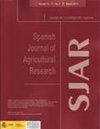Total phenolics, quercetin glycosides and antioxidant activity in organic and conventional orchards in three apple cultivars during fruit growth
IF 0.8
4区 农林科学
Q3 AGRICULTURE, MULTIDISCIPLINARY
引用次数: 1
Abstract
Aim of study: To evaluate whether organic and conventional management practices, cultivar and fruit growth stage affect total phenolic content, antioxidant activity and quercetin glycosides in apples of three cultivars. Area of study: The trials were conducted in commercial orchards located in Chimbarongo, O’Higgins Region, Chile. Material and methods: Two types of orchard management (organic and conventional) were studied in three apple cultivars: Gala 'Brookfield', Granny Smith and Fuji 'Raku Raku'. Total phenolic content, antioxidant activity and quercetin glycosides were evaluated according to management practices, fruit growth stage, cultivar, fruit weight and skin surface. Data were analyzed statistically using a truncated multiple regression model. Main results: No differences were found between organic and conventional management regarding polyphenol concentration and antioxidant activity, except for specific quercetin glycosides. However, significant differences were observed between cultivars in both variables, as well as in fruit development throughout the season, which showed a significant dilution of polyphenols and antioxidant activity as the fruit grew. Research highlights: Cultivar and fruit growth stage were decisive in total phenolic content, glycosidic quercetins and apples antioxidant activity. Conventional and organic management practices were significant for quercetin glycoside concentration, which is the main polyphenol in apples.三个苹果品种有机园和常规园果实生长过程中的总酚、槲皮素苷和抗氧化活性
研究目的:评价有机和常规管理方式、品种和果实生长阶段是否影响三个品种苹果的总酚含量、抗氧化活性和槲皮素苷。研究领域:试验在智利奥希金斯地区Chimbarongo的商业果园进行。材料和方法:对Gala‘Brookfield’、Granny Smith和Fuji‘Raku Raku’三个苹果品种的两种果园管理(有机和常规)进行了研究。根据管理实践、果实生长阶段、品种、果实重量和皮表面积对总酚含量、抗氧化活性和槲皮素苷进行了评价。使用截断多元回归模型对数据进行统计分析。主要结果:除了特定的槲皮素苷外,有机管理和传统管理在多酚浓度和抗氧化活性方面没有发现差异。然而,在这两个变量以及整个季节的果实发育方面,品种之间都存在显著差异,这表明随着果实的生长,多酚和抗氧化活性显著降低。研究重点:品种和果实生长阶段对总酚含量、糖苷槲皮素和苹果抗氧化活性有决定性影响。槲皮素苷是苹果中的主要多酚,常规和有机管理措施对槲皮素苷的浓度有重要影响。
本文章由计算机程序翻译,如有差异,请以英文原文为准。
求助全文
约1分钟内获得全文
求助全文
来源期刊

Spanish Journal of Agricultural Research
农林科学-农业综合
CiteScore
2.00
自引率
0.00%
发文量
60
审稿时长
6 months
期刊介绍:
The Spanish Journal of Agricultural Research (SJAR) is a quarterly international journal that accepts research articles, reviews and short communications of content related to agriculture. Research articles and short communications must report original work not previously published in any language and not under consideration for publication elsewhere.
The main aim of SJAR is to publish papers that report research findings on the following topics: agricultural economics; agricultural engineering; agricultural environment and ecology; animal breeding, genetics and reproduction; animal health and welfare; animal production; plant breeding, genetics and genetic resources; plant physiology; plant production (field and horticultural crops); plant protection; soil science; and water management.
 求助内容:
求助内容: 应助结果提醒方式:
应助结果提醒方式:


